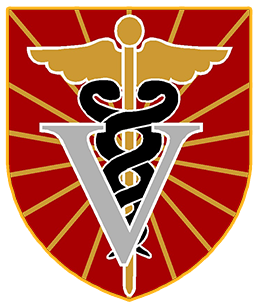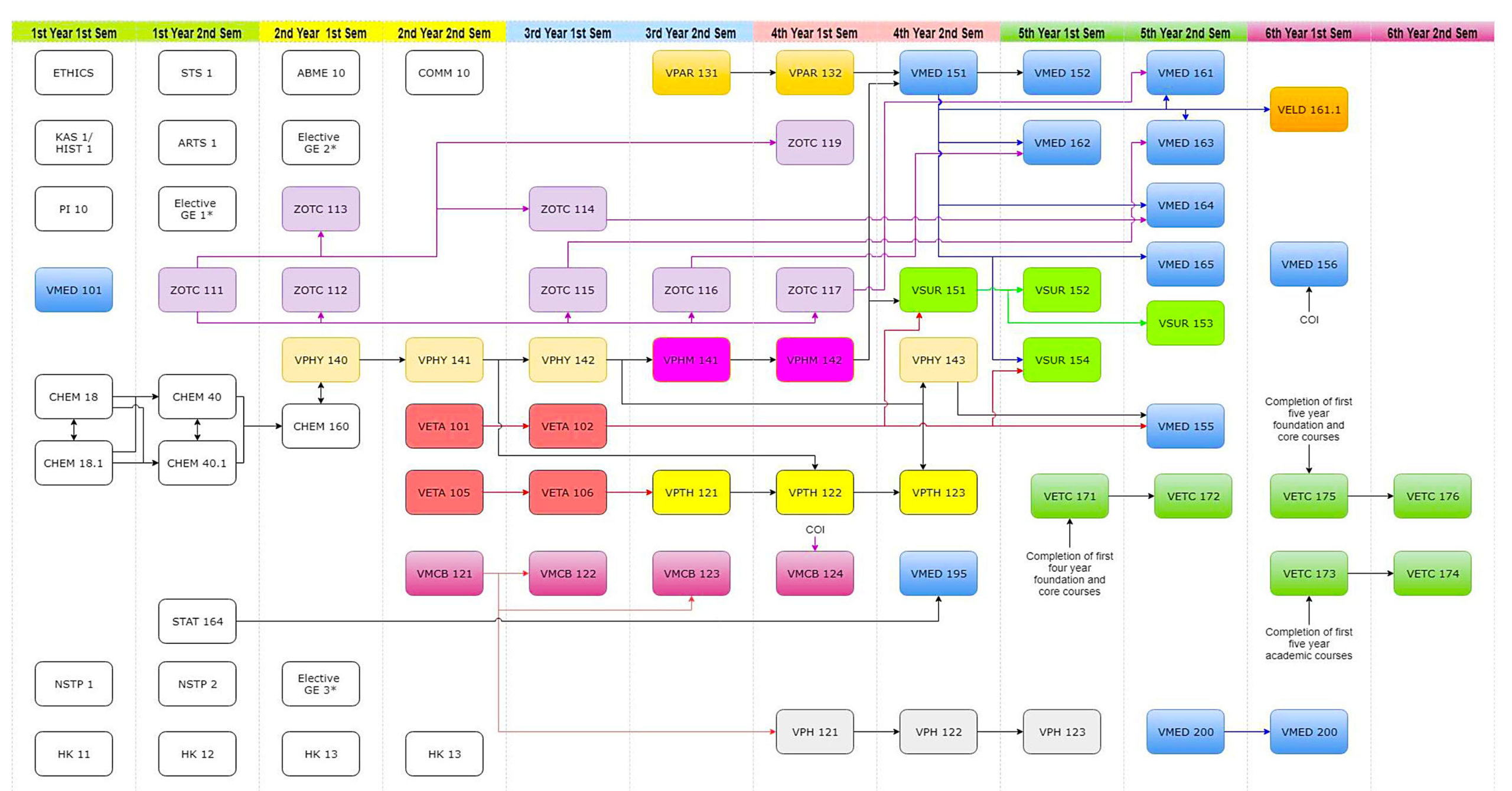The DVM program is a six-year professional curriculum consisting of 27 units of GE course work, 21 units of foundation courses and 173 units of veterinary courses taken in the three different departments, the Department of Basic Veterinary Sciences (DBVS), Department of Veterinary Paraclinical Sciences (DVPS), and the Department of Veterinary Clinical Sciences (DVCS).
The students acquire both theoretical knowledge and practical experience in animal production and in the diagnosis, prevention, treatment, and control of diseases in companion, exotic, and farm animals, and are prepared to conduct research and extension activities. in companion, exotic and farm animals.
Programme Specification
Awarding Body
-
Constituent University: University of the Philippines Los Baños
-
College:
College of Veterinary Medicine
Degree Granting Unit
- College of Veterinary Medicine
Details of the Accreditation by a Professional or Statutory Body
On the 11th of January 2000, the Commission on Higher Education (CHED), upon the recommendation of the Office of Programs and Standards (OPS) and the Technical Panel for Agriculture Education (TPAE) designated the U. P. College of Veterinary Medicine as the lone Center of Excellence for Veterinary Education for three years (2000-2002) through Resolution No. 42-2000. This status has been renewed on the 1st of January 2016 until the 31st of December 2018.
To continuously assess and improve the core academic functions in teaching, research, creative works, extension, and public service, the Internal Academic Assessment and Development System (iAADS+) is conducted by the University of the Philippines Office of the Vice President for Academic Affairs (UP OVPAA). Through the generation of self assessment reports, the performance of the unit is measured against the required qualitative and quantitative parameters.
Program Title
- Doctor of Veterinary Medicine degree
Name of Final Award
- Doctor of Veterinary Medicine
Program Educational Outcomes
The DVM Program aims to produce graduate who are:
- Competent in the diagnosis, treatment, control, and prevention of local and transboundary animal diseases in various species
- Competent to formulate, communicate, and implement programs in animal production, food safety, public health, animal welfare and environmental protection and preservation both locally and internationally
- Achievers, team players, and leaders in the profession and related fields of practice
- Able to handle and conduct researches in pharmaceutical, biotechnological, and other fields of agriculture; and
- Capable of imparting knowledge, conduct trainings, and extension services
Program Learning Outcomes
Common To All Program
- Articulate and discuss the latest developments in the specific field of practice and engage in life-long learning (PQF level 6 descriptor)
- Effectively communicate orally and in writing using both English and Filipino
- Work effectively and independently in multi-disciplinary and multi-cultural teams (PQF level 6 descriptor)
- Act in recognition of professional, social, and ethical responsibilities
- Preserve and promote “Filipino historical and cultural heritage” (based on RA 7722)
Specific to the Program
- Apply fundamental principles and mechanisms underlying animal production and welfare, health, and diseases
- Apply fundamental principles and mechanisms underlying animal production and welfare, health, and diseases
- Implement evidence-based treatment and related procedures for diseases and abnormalities of animals
- Formulate plans and programs for prevention and control of animal and zoonotic diseases
- Design for implementation social and entrepreneurial ventures in the field of practice
Common to the Discipline
- Generate and share knowledge relevant to specific fields in the study of agriculture and veterinary medicine
- Formulate and implement agricultural and veterinary development plans and programs
Specific to the University of the Philippines
- Lead with honor and excellence in public service and in fields of practice
Admission Criteria or Requirements to the Programme
Those who wish to take Doctor of Veterinary Medicine have two (2) options on how they can be admitted to the program. They can enter either as a new freshman or as a transfer student. If entering as a new freshman, the high school student needs to take the UPCAT (University of the Philippines College Admission Test) which is held annually. If entering as a transfer student from other UP Constituent University, the student must have earned at least 30 collegiate academic units, and must have a GWA of 2.50 or better. If entering as a transfer student from other universities and colleges, the student must have earned at least 33 collegiate academic units, and must have at least GWA of 2.0 or better.
Applicants with a baccalaureate degree may also apply for entry into the DVM Program. If the baccalaureate degree was obtained from any UP Constituent University, the GWA requirement is 2.75 or better for Allied Field graduates, and GWA of 2.50 or better for Non-Allied Field graduates. If the baccalaureate degree was obtained from other universities and colleges, the GWA requirement is 2.50 or better for Allied Field graduates, and GWA of 2.00 or better for Non-Allied Field graduates.
Foreign or Filipino high school graduates who obtained their diploma abroad and have not enrolled in college may be admitted as new freshmen by automatic admission or by taking the UPCAT. A foreign student with college-level course work credits should meet the University requirements for transfer students, including required TOEFL scores when the medium of instruction of the attended school is not English.
Relevant Benchmark Statement
- Commission on Higher Education (CHED) Memorandum Order No. 1 series of 2018 which details the Programs, Standards and Guidelines (PSG) for the Doctor of Veterinary Medicine (DVM) Program
Program Structure and Requirements
-
Number of years:
6-year undergraduate program
-
Credit Units:
221 units
Revised Doctor of Veterinary Medicine Curriculum
Effective Academic Year 2018-2019
ARTS 1. Critical Perspectives in the Arts (3)
COMM 10. Critical Perspectives in Communication (3)
ETHICS 1. Ethics and Moral Reasoning in Everyday Life (3)
KAS 1/HIST 1. Kasaysayan ng Pilipinas/ Philippine History (3)
STS 1. Science, Technology, and Society (3)
PI 10. Life and Works of Jose Rizal (3)
ELECTIVE GE (9)
MATH 10. Mathematics, Culture, and Society (3)
SAS 1. Self and Society (3)
WIKA 1. Wika, Kultura, at Lipunan (3)
PHILARTS 1. Philippine Arts and Culture (3)
SCIENCE 10. Probing the Physical World (3)
SCIENCE 11. Living Systems: Concepts and Dynamics (3)
HUM 3. Reading Film, TV, and the Internet (3)
SOSC 3. Exploring Gender and Sexuality (3)
PHLO 1. Understanding Philosophy (3)
CHEM 18. University Chemistry (3)
CHEM 18.1. University Chemistry Lab (2)
CHEM 40. Basic Organic Chemistry (4)
CHEM 40.1. Basic Organic Chemistry Lab (1)
CHEM 160. Introductory Biochemistry (3)
VPHY 140. Biochemical Aspects in Animal Processes (2)
STAT 164. Statistics for the Biological Sciences (3)
ABME 10. Foundations of Entrepreneurship (3)
VELD 161.1. Laboratory Diagnostics in Veterinary Medicine (2)
VETA 101. Macroscopic Anatomy I (5)
VETA 102. Macroscopic Anatomy II (4)
VETA 105. Microscopic and Developmental Anatomy I (3)
VETA 106. Microscopic and Developmental Anatomy II (4)
VETC 171. Introduction to Clinics (2)
VETC 172. Clinical Clerkship (2)
VETC 173. Clinical Conference I (1)
VETC 174. Clinical Conference II (1)
VETC 175. Clinical Internship I (6)
VETC 176. Clinical Internship II (14)
VMCB 121. General Microbiology (4)
VMCB 122. Veterinary Microbiology and Mycology (3)
VMCB 123. Veterinary Virology (3)
VMCB 124. Fundamentals of Immunology (2)
VMED 101. Animal Welfare (3)
VMED 151. General Principles of Veterinary Medicine (2)
VMED 152. Canine and Feline Medicine (4)
VMED 161. Equine Medicine 2)
VMED 162. Poultry Medicine (3)
VMED 163. Ruminant Medicine (2)
VMED 164. Swine Medicine (3)
VMED 155. Theriogenology (3)
VMED 156. Jurisprudence, Ethics, and Economics (2)
VMED 165. Aquatic and Wildlife Medicine (2)
VMED 195. Research Methods in Veterinary Medicine (3)
VMED 200. Undergraduate Thesis (6)
VPAR 131. Veterinary Entomology and Protozoology (4)
VPAR 132. Veterinary Helminthology (4)
VPH 121. Epidemiology (3)
VPH 122. Zoonoses (2)
VPH 123. Food Hygiene (4)
VPHM 141. Veterinary Pharmacology and Therapeutics I (4)
VPHM 142 Veterinary Pharmacology and Therapeutics II (4)
VPHY 141. General Physiology (4)
VPHY 142. Systemic Physiology (4)
VPHY 143. Veterinary Endocrinology and Reproductive Physiology (4)
VPTH 121. General Pathology (4)
VPTH 122. Systemic Pathology (3)
VPTH 123. Clinical Pathology (3)
VSUR 151. Principles of Surgery and Anesthesiology (3)
VSUR 152. Small Animal Surgery (4)
VSUR 153. Large Animal Surgery (3)
VSUR 154. Veterinary Diagnostic Imaging (2)
ZOTC 111. General Principles of Animal Production (3)
ZOTC 112. Principles of Animal Breeding (3)
ZOTC 113. Principles of Animal Nutrition (3)
ZOTC 114. Swine Production (3)
ZOTC 115. Ruminant Production (3)
ZOTC 116. Poultry Production (3)
ZOTC 117. Equine Production (2)
ZOTC 119. Husbandry and Health Management of Laboratory Animals (3)
Course Map (Revised Doctor of Veterinary Medicine Curriculum, Effective A.Y. 2018-2019)
Date of BOR Approval of Most Recent Program Specification
- 03 September 2018

